
Mrs. Harden nearly died today.
I know because I was there.
I saw her slumped
on her kitchen floor
looking white as an egg.
I wasn’t there
from the beginning, though.
Only from the time
my little brother, Parker,
went missing.
It seems Parker wanted to
drive somewhere
on his new trike.
He’s only allowed to go
one house up
each way.
And only if he tells someone
where he’s going.
He obeyed the first rule.
(Mrs. Harden lives next door.)
But he forgot the second rule.
He told no one.
He drove to Mrs. Harden’s.
He parked in her driveway.
He knocked at her back door.
She invited him in
for a cookie.
That’s how it started.
Before Mrs. Harden
could reach the cookie jar,
she had what grown-ups call
“a spell.”
Parker saw her collapse.
He remembered his safety lessons.
He climbed on a chair.
He reached for the phone.
He dialed 911.
This is where I come in.
I find him

shouting to the dispatcher:
“Emergency! Emergency!”
I’m here because
Mrs. Harden and I
are supposed to paint posters
for her women’s club bake sale.
Paints and rags and poster board
are sitting on her craft table.
Mrs. Harden and I do lots of
projects together.
She is sort of an honorary
grandmother to me.
(My real ones live across the country.)
I crouch on the floor
next to her.
I take her hand.
It’s cold and clammy.
I pat it.
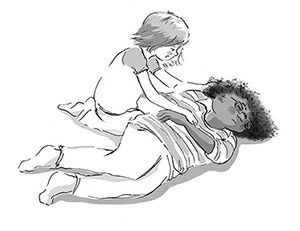
“It’s me. Suzy,” I tell her.
“Don’t worry, Mrs. Harden. Help is on the way.”
The ambulance comes.
The EMTs wheel Mrs. Harden
off on a stretcher.
Now Dad is in the driveway
asking what happened.
Neighbors mill around
shaking their heads,
whispering.
Mrs. Capra pats Parker
on the head.
“So you’re the little hero.”
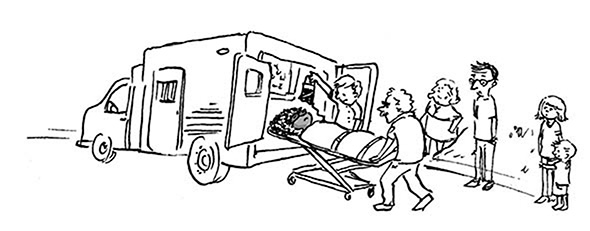
Dad calls Mrs. Harden’s nephew, Paul.
Mrs. Harden is a widow. No children.
A couple years ago she gave us
Paul’s phone number “just in case.”
Paul says for us to lock up
his aunt’s house.
He asks us to hold her mail,
take in her newspapers,
keep an eye on things
until he finds out
what’s what.
Back home,
Parker is all monkey-faced
(which is what he calls
being upset).
I give him a hug.
“Don’t worry,” I tell him.
“Mrs. Harden will be okay.
She’s in good hands now.”
(I don’t tell him
how worried I am.)
Parker sniffles.
“Yes, but Mrs. Capra
called me a little hero.
I’m not little, Suzy.
I’m four and a half.
I’m a big hero.”
Parker pumps
his (little) fist in the air.
“I’m Hero Boy!”
Wait till Mom finds out.
She likes Mrs. Harden
almost as much as I do.
Mom’s in Arizona right now,
taking care of Grandma Fludd,
who recently had a bad fall.
Gee—two people I know
in the hospital.
My best friend, Alison,
says bad things come
in threes.
Uh-oh, I think.
What’s next?
Dad puts Mom on speakerphone
so Parker and I can hear too.
She says she hopes Mrs. Harden
will be okay.
She says she is proud of
her “big boy”
for dialing 911.
She says: “Thank you, Suzy Q,
for helping out with things.”
(“Things” is code
for Parker.)
She says she is trying to convince
Grandma Fludd to move
to Pennsylvania.
Up pipes Grandma Fludd:
“What? And freeze my patootie off
in the winter? Forget it!”
Parker howls,
wiggles his little behind.
“Patootie! Patootie!
Watch me shake my bootie!”
There’s a voice mail from Alison.
She sounds all breathless:
“Sooze, I heard about Mrs. Harden.
The whole town is talking.
I hope she’s not dead.
Is she?
Is she?
Call me!
Right away!”
I call Alison.
“Tell me—quick!” she says.
I tell her: “We got a message
from Mrs. Harden’s nephew.
She’s going to be okay.”
“Whew! What a relief,”
says Alison.
“Just imagine if she died.
You’d be neighbors
with a dead person!”
I was in second grade
when Herbie Sizemore
pushed me up against
the playground fence.
“Say it!” he ordered.
“It” was a bad word.
A very bad word.
The very, very worst.
“No,” I told him.
I tried to push past him.
He wouldn’t let me.
Suddenly a girl appeared,
bracelets jangling.
She stared Herbie
right in the nose.
“Let her go,” she snarled.
I was surprised.
She was in the other
second-grade class.
We never played together.
Herbie growled: “This is
nunna your beeswax.”
“I’m making it my beeswax,”
said the girl.
She pulled a sparkly pink phone
from her pocket.
“I have the state police
on speed dial.”
“Yeah, right,” said Herbie.
The girl punched a button.
Herbie backed off.
When he was gone,
I said: “That’s a toy phone,
isn’t it?”
The girl wagged her finger.
“Nunna your beeswax.”
I laughed. “You rescued me.”
“I’m Alison Wilmire,” she said.
“I’m Suzy Quinn,” I said.
We shook hands.
We’ve been best friends
ever since.
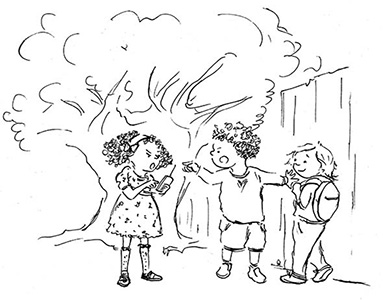
Which is pretty amazing
since we’re so different.
Alison is curly blond wonder-hair.
I’m mousy brown ponytail.
She’s pink sandals and short skirts.
I’m red Phillies cap and jeans.
She’s hip-hop dance lessons.
I’m “Go, Phillies!”
She collects bracelets.
I collect rocks.
She wants to be an actress when she grows up.
I don’t have a clue.
Dad says Alison and I
are a perfect example of
the old saying
“Opposites attract.”
Mom says
while Alison and I
may be different
on the outside,
we are a lot alike
on the inside
where it counts most.
“You both have heart,”
Mom says.
“That’s the best thing
I can say about
a person.”
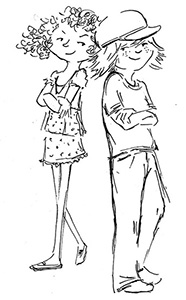
When Mom first went to Arizona,
Parker got all stubborn
about bedtime.
Dad and I tried extra bedtime stories.
Extra snacks.
New stuffed animals.
Old stuffed animals.
Blue night-light.
Glow-in-the-dark stickers.
Nothing worked—
until I came up with
Tickle Monster.
I started creeping
into Parker’s bedroom
step by step,
waving Mom’s feather duster.
“Here comes Tickle Monster,”
I’d say.
I only had to tickle Parker’s big toe
before he would giggle and beg:
“Stop! Stop, Tickle Monster!
I’ll sleep now!”
But this night
when I creep into his room,
he’s all curled up
with his stuffed owl,
snoring like
a little eggbeater.
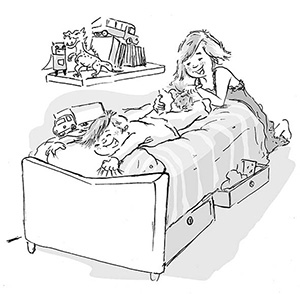
I guess it’s exhausting
being a hero.
I’m tired too.
I get into my nightie.
I open my window wide.
There’s a cool June breeze blowing.
It feels like it might rain.
I tell Ottilie—my goldfish—about
the day’s excitement:
“Mrs. Harden nearly died today.
But Parker called 911.
And now she’s going to be fine.
And the Phillies beat the Pirates—
even though I missed watching
the whole game on TV.
And we talked to Mom and Grandma Fludd.”
Ottilie swims closer
to the glass in front of her tank.
Her tiny fish mouth sends me kisses.
I think she enjoys our nighttime chats.
Alison says
Ottilie is just a goldfish
and goldfish don’t know anything.
But I read about goldfish
before I got Ottilie.
Goldfish can recognize their owners.
They react to light and different colors.
I trained Ottilie to eat fish flakes
from my fingers.
Ottilie knows plenty.
Dad—who teaches history
at Ridgley Community College—
told me that in 1939
a fad was started by
a Harvard University student
who swallowed a live goldfish.
The fad spread to other colleges.
Eventually, Dad said,
the president of Boston’s Animal League
decreed that goldfish swallowers
should be—would be—
arrested
if they didn’t stop this behavior.
My sentiments exactly.
Ottilie’s too!
This morning Gilbert Lenhardt stops by.
He heard about Mrs. Harden.
He was supposed to weed her herb garden
and pull out a dead holly bush.
He is wondering if he should go ahead.
Dad tells him yes.
Gilbert does a lot of odd jobs around the neighborhood.
He’s thirteen. Not old enough to get a
regular job.
According to Alison, Gilbert really needs the money.
His dad drinks a lot and probably spends
his money on beer instead of his family.
For a kid with a father like that, Gilbert is always
cheery. Always whistling.
You can hear him a block away.
Dad says they are songs from the 1940s.
Odd—but nice too.
One thing I’ve learned from Dad is
to appreciate ancient history.
Ten minutes later,
there’s a knock at the door.
“Hi,” says a lady in a gray suit.
“I’m Marsha Levine, reporter for
the Ridgley Post.“
She introduces the man next to her—
“And this is Joe Perchek, photographer.
We’re here to see the little boy
who called 911 yesterday.
The little hero.”
Dad says it’s okay
for them to talk to Parker
for a few minutes.
And to take a couple
pictures for the paper.
Parker says: “Wait!”
He runs upstairs,
comes back wearing
his Superman T-shirt
and his Count Dracula cape
from last Halloween.
He poses—arms out
like he’s flying.
Ms. Levine tweaks his cheek.
“You’re the cutest little boy ever.”
Parker squawks: “Don’t call me little!”
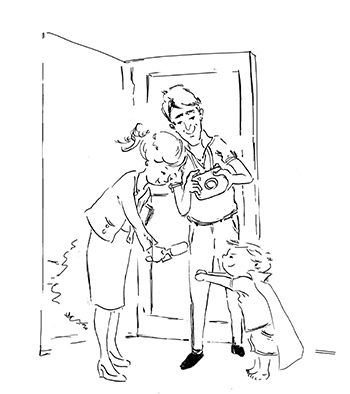
I head over to Alison’s.
I pass Mrs. Bagwell’s.
Mrs. Bagwell is chasing after something
with her big green flyswatter.
Mrs. Bagwell is always after something—
kids trying to retrieve balls from her yard,
beetles nibbling her roses,
the Kims’ gray cat, Shady.
This time it’s a crow.
I wave. “Good morning, Mrs. Bagwell.”
“Dang crow,” she growls.
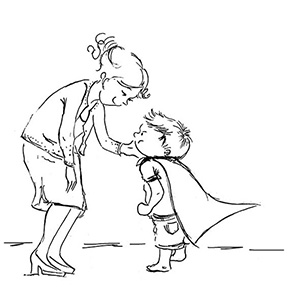
When I get to Alison’s,
she is still getting dressed.
She dangles two bracelets under my nose.
“Which one, Sooze—garnet or charm?”
I groan. “Who cares? We’re just going
to the library.”
She rolls her eyes at me. “I repeat—garnet or charm?”
I point to the garnet bracelet.
She scowls. “You’re only saying that because it’s red.
Like the Phillies.”
She flips both bracelets into her jewelry box.
She pulls out a purple beaded one
that matches her nails.
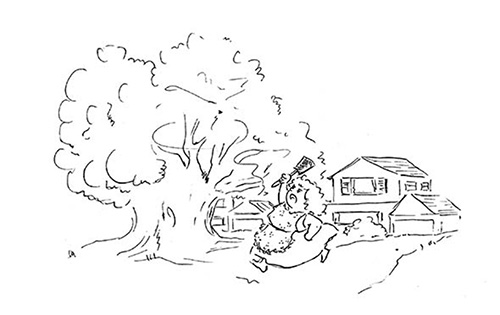
I coaxed Alison into
signing up with me for
Tween Time at the Ridgley Library.
Every Tuesday morning at eleven.
She fought it.
She said she reads enough
during the school year.
I told her: “Tween Time isn’t
just about reading.
It’s crafts too. And games. And field trips.”
Anyway—what’s wrong with reading?
I happen to love it.
It’s in my DNA.
I get it from my mom,
who is totally addicted to books.
Nobody—
I mean nobody—
loves books
more than Mom.
She breathes books—literally.
She holds them up to her nose,
takes deep whiffs.
“Each book has a scent
all its own,” she says.
“Ink, tree bark, a hint of thyme,
summer-dust.”
Dad pipes up: “Mold!”
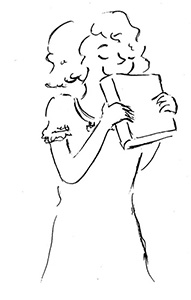
He’s remembering when Mom
bought six cartons of books
from someone’s half-flooded basement.
Mom sleeps books.
She keeps one under her pillow.
I’m not kidding.
She got into the habit
when she was a kid.
She used to wake up at night
and read by moonlight.
I won’t be shocked
if one morning
I come down to breakfast
and find Mom
in one of her fogs,
eating a page of a book
with a dollop of strawberry jam.

We tweens, ages ten to twelve,
meet in the Bennett Room
of the Ridgley Library.
One of the librarians—Ms. Mott—
stands in the doorway.
She’s wearing a black bonnet
and a fringed blue shawl.
She’s twirling a parasol
(which is an umbrella for sun).
“Welcome, tweens,” she says,
chirpy as a bird.
Alison gives me a dark look.
“Give it a chance,” I whisper.
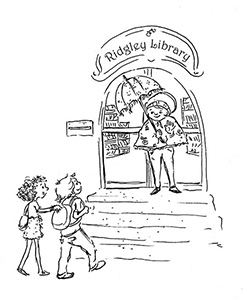
There are three other
kids in the room.
Two girls and a boy.
Alison and I don’t know them.
Ms. Mott sighs.
She looks at her watch.
Sighs again.
I think she was hoping for
a bigger crowd.
Finally she closes her parasol.
She smiles
and makes an announcement:
“The theme for Tween Time
this summer is
everyday life in the 1800s.”
Alison slumps in her seat,
hisses at me:
“I hate history!”
“Any questions?” asks Ms. Mott.
No one raises a hand.
I feel bad for her.
So I raise my hand.
“Yes, Suzy?”
“Was there baseball back then?”
Ms. Mott brightens. “Indeed there was.
But the field was smaller.
And players didn’t wear gloves.
And batters were called strikers.
And runs were called aces.”
The boy raises his hand.
“Were there cars?”
“Yes,” says Ms. Mott.
“As a matter of fact, in 1895
there was a total of four cars
in the entire country.”
“Holy cow!” says the boy.
The girl in green asks,
“What did kids do for fun?”
“Simple things,” says Ms. Mott.
“Roller-skating, kite flying,
sledding, checkers, kickball,
hoop rolling.”
“What’s hoop rolling?” asks
the girl with the pigtails.
“You’ll see,” says Ms. Mott.
“We’ll be trying some of these things
in the weeks to come.”
Alison mutters under her breath:
“Whoop-dee-doo.”
By the time we are dismissed,
we’ve learned quite a bit
about the 1800s.
We know that—according to
stagecoach etiquette—
it was considered bad manners
to point out where horrible murders
had been committed.
We know that
some people in the 1800s
made toothpaste out of
honey and pulverized charcoal.
And that tomatoes were
thought to be poisonous.
And that “some pumpkins”
meant “impressive”
or “very good at.”
As we left, Ms. Mott chirped:
“When it comes to paying attention,
you kids are some pumpkins.”
Alison grabs my arm.
“Let’s skedaddle,” she says—
which in 1800s talk means
“Let’s get the heck out of here!”
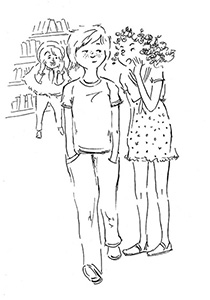
Dad makes grilled cheese for lunch.
I tell him about the Tween Time theme.
Of course he’s pleased.
He waves his sandwich at me.
He says what I’ve heard
a hundred times before:
“History is life. Its purpose is a better world.”
“I know, Dad,” I say.
Parker pipes up: “I know something too!”
“What?”
“Mrs. Bagwell got robbed!”
“You missed it, Suzy,” says Parker.
“Cops came and everything.”
“Only one police officer,” says Dad.
“Seems Mrs. Bagwell wanted to report
a stolen ring.”
“There’s robbers in town!” says Parker.
“We don’t know that,” says Dad.
I get to thinking about
bad things happening in threes.
Grandma Fludd falls.
Mrs. Harden has a spell.
And now
Mrs. Bagwell is a crime victim.
Maybe Alison was right.
After lunch, I get on my bike.
Alison gave hers away last year.
“Bikes are for babies,” she told me
at the time.
“Tell that to Mr. Capra,” I said.
“He rides his bike to work every day.”
She ran her nose up the flagpole.
“Okay—babies and old people.”
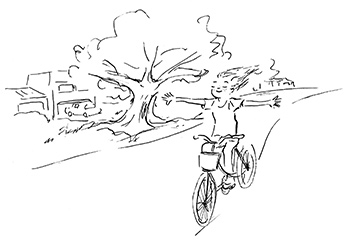
It’s a bright afternoon.
I ride my bike
into the warm breeze,
away from the house,
along the bike path.
Trees ripple green.
The light is golden.
The sky is blue.
And I am a bird
flying …
flying …
Alison doesn’t know
what she’s missing.
I get back in time
to keep an eye on Parker
while Dad grades papers.
I set up Candy Land,
Parker’s favorite board game.
Parker keeps talking about
Mrs. Bagwell’s stolen ring.
Then he asks:
“Do robbers smoke?”
“What do you care?” I say.
“Just answer.”
“I guess some do.”
“Well, if we get a robber,
I hope he smokes.”
“How come?”
“So he’ll set off the smoke alarm.”
Parker is famous.
His photo—in his Superman shirt
and Count Dracula cape—
is on the front page of
the Ridgley Post.
The headline reads
LITTLE HERO DIALS 911.
Parker asks me to read it to him.
“Big Hero Dials 911,”
I say.

By late afternoon,
our living room is filled with
balloons,
cookie bouquets,
stuffed animals,
and flower arrangements.
All for Parker,
who is becoming
more obnoxious by the minute.
“Stay away from my balloons!”
“Don’t touch my cookies!”
“Hands off my animals!”
“Don’t smell my flowers!”
Little hero?
How about little monster?
The phone doesn’t stop ringing.
Mom calls.
She tells Dad to pop a copy
of the Ridgley Post in the mail
care of Grandma Fludd—
“Today!”
Mrs. Capra calls
to say she saw the article.
“Isn’t it just wonderful!”
Alison calls.
“How does it feel?”
she asks.
“How does what feel?”
I say.
“Your brother’s a hero.”
“Yeah—hero brat.”
The mayor’s secretary calls.
She tells Dad:
“Mayor Paloma would like
your son to ride in her car
in the Fourth of July parade.”
I tell Dad: “I’m going
over to the creek
to look for rocks.”
No phones at the creek.
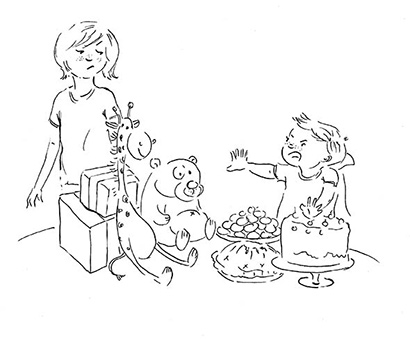
The creek isn’t far.
I leave my bike home
and walk.
I carry an old toy beach pail.
I’m fussier about my rocks
than I used to be.
I know I won’t fill the pail.
I’ll be happy if I find
just one special rock.
I’m ankle-deep in water
when I finally see one.
Smooth. Speckled green.
Like the egg of a rare bird.
I can feel myself smiling
as I pick it up.
Sometimes I put one of my rocks
in Ottilie’s tank.
Some rocks I let Parker borrow
for when he plays with
his plastic cowboys.
Not this one.
This is one of the all-time
beauties.
This baby is all mine.
“Did you find one?”
I turn. It’s Alison.
“Your dad told me
you were here.”
“Look,” I say, all excited.
I show her the green speckled rock.
She ignores it. “Did you
hear the news?” she asks.
“Do you see my gorgeous rock?”
I ask.
Alison gives me a look.
“It’s a rock,” she says.
I give up.
“Yes, I heard the news.
Parker’s invited
to ride in the mayor’s car
in the Fourth of July parade.”
“Wow!” Alison squeals.
“That’s really something. But
it’s not the news
I’m talking about.”
There seems to be
a rumor going around
that Gilbert
is the one
who robbed Mrs. Bagwell,
took her ring.
Mrs. Bagwell says
she’s 95 percent certain of it.
Dad says Mrs. Bagwell
shouldn’t be accusing Gilbert
without proof.
Just because
Gilbert moved some boxes
from Mrs. Bagwell’s attic
and had to pass by
her bedroom
where she keeps her jewelry
doesn’t mean he took her ring.
“No more than I took it,”
says Dad, “when I fixed
her ceiling fan.”
Mrs. Harden is being discharged
from the hospital tomorrow.
I’m making a Welcome Home card
for her.
Parker wants to make one too.
He comes into my room
with his can of broken crayons
in one hand
and a fistful of cookies
in the other.
He’s still wearing
his hero outfit.
(He even sleeps in it.)
“Can you help me, Suzy?”
I give him a look. “Can you be nice?”
“I can be nice,” he says.
He holds out his fist.
“Here. Take a cookie.”
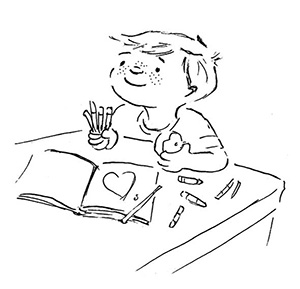
Mrs. Harden is home and
looking tired.
Her nephew, Paul,
has an important meeting today.
He asks if I will stay
with his aunt
for a couple hours—
“just to make sure
there are no problems.”
“Sure,” I tell him.
And it’s a good thing
I’m there,
because as soon as Mrs. Harden
goes up to her room
to take a nap,
the doorbell starts ringing.

It’s the mailman
with a package.
It’s the florist
with a dozen roses.

It’s Mrs. Capra
with a bowl of stewed plums.
And then Mrs. Kim
with cookies.
Last, it’s Mrs. Bagwell
with one of those
rotisserie chickens
from the supermarket.
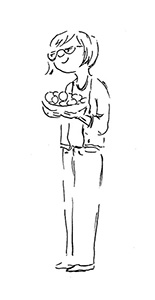

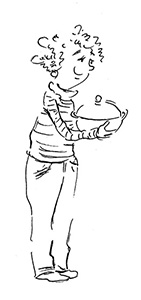
I don’t like how
Mrs. Bagwell is blaming
Gilbert
for stealing her ring
when she has no proof.
I act polite, though.
I tell her Mrs. Harden
is resting.
I thank her for the chicken.
I feel like throwing the chicken
into the garbage.
But I don’t.
The chicken didn’t
accuse Gilbert.
Mrs. Harden is up from her nap
when the doorbell rings again.
It’s Gilbert.
He’s carrying a big planter of mint.
“Keep it in the pot,” he says,
sounding like a garden pro.
“If you plant it in the ground,
it will take over.”
Mrs. Harden smiles.
“I’ll set it on the patio tomorrow,”
she says. “For now, put it on
the coffee table
so I can smell it.”
I’m careful not to mention
Mrs. Bagwell’s accusation.
For a while I think Gilbert
is doing okay until I realize
I didn’t hear him whistling
up the walk.
I walk out with Gilbert
to the end of the driveway.
I want to say something
that will cheer him up.
“So, Gilbert. Want to do something?”
“Sure. But you’re busy now.”
“Right—so … someday?”
“Okay. Good. Someday.
Do what?”
“Right. What?”
“Well?”
“Want to collect rocks with me?”
Gilbert frowns.
“Scratch rock collecting,” I say.
“No offense,” he says. “I’m just
not into rocks.”
“I understand,” I say. “So … let’s think.
What do we both like?”
“How about food?” he says.
“Food—” I say. “Can’t go wrong
with that.”
“Ice cream,” he says.
I give him a high five. “Ice cream!”
“Someday,” he says.
“Someday,” I say. I head back
to Mrs. Harden.
Suddenly I turn and call to Gilbert:
“My treat!”
Gilbert gives a fist pump.
“Yes!”
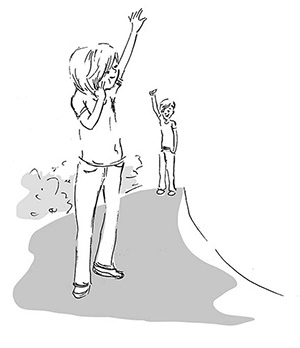
Mom is coming home!
On Saturday.
Grandma Fludd is much stronger.
And she has lots of friends
at Sunshine Terrace
if she needs anything.
I didn’t realize how much
I missed Mom
until I burst into tears
when Dad told me.
It takes a lot of convincing,
but finally I get Parker
to accept the fact
that he can be a hero
without the Superman shirt.
I tell him it’s starting to stink.
I tell him the bad guys
will smell him coming.
He lets me pull the shirt off.
He puts on the Phillies shirt
I got him last Christmas.
I can’t talk him out of
the cape.
Alison stops by.
I tell her I’m going to Bean’s Books.
“Mom is flying home on Saturday.
I want to get her a gift card.”
Alison says she’ll come along.
On the way
Alison brings up Gilbert
and Mrs. Bagwell’s ring.
I tell her: “I don’t want to talk about it.”
“Why not?”
“It’s gossip and Gilbert is a friend.”
Alison raises an eyebrow. “Aha!”
“A friend.“
“A boyfriend,” she squeals. “Wooo-hoooo.”
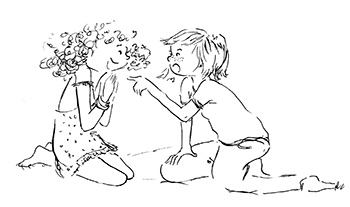
I poke her. “Back off. He’s just a friend.
Who happens to be a boy.”
“Well, anyway,” says Alison. “My cousin Tara
says he probably did it.
Where there’s smoke, there’s fire.”
“That’s it,” I say. “I’m not going to
talk about it.”
Alison clamps her lips together. “Fine,” she says.
“Fine,” I say.
One thing about Alison—
she doesn’t stay in the same mood
for long.
By the time we get to Bean’s,
she’s back to being chatty.
“So,” she says, “what do you want
for your birthday?”
“Well, there’s no point asking for
my own phone or computer,” I say.
“Dad already told me. Not till I’m thirteen.”
Alison’s parents have told her the same thing.
She rolls her eyes. “Parents!”
My birthday is July 15.
I’ll be twelve.
I’ve been calling myself twelve
since school let out.
Mom says not to wish my childhood away.
But I don’t think of myself
as a child.
Parker is a child. I’m a kid.
There’s a difference.
I’ve already told my parents
what I want for my twelfth birthday.
I want to go to a Phillies game.
Citizens Bank Park—
home to the Philadelphia Phillies—
is a two-and-a-half-hour drive
from Ridgley.
Going to a game
means staying over
at a hotel in the city.
So it would be
an expensive
birthday present.
But hey—it’s the big one-two.
A person turns twelve
only once.
I tell Ottilie:
“Mrs. Harden is out of the hospital.”
Ottilie flicks her tail fin.
I think it’s her way of smiling.
“And Mom is coming home.
And I forgot to tell you before—
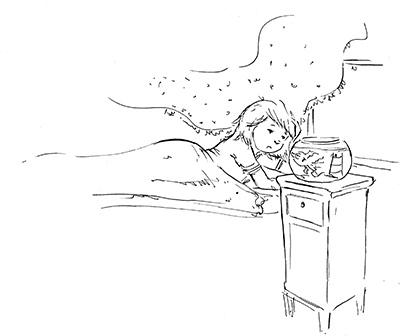
Parker is riding with Mayor Paloma
in the Fourth of July parade.”
Another fin flick.
“And I’m jealous and—”
The fin stops.
I stop.
My hand shoots to my mouth,
clamps it shut.
Ottilie and I boggle at each other,
both fish-eyed.
I can’t believe I said that.
I go over to check on Mrs. Harden.
She is up and dressed
and having tea.
Her cheeks are rosy.
She doesn’t look tired anymore.
She gives me a hug.
“I’m so glad you stopped by, Suzy,”
she says.
“I have something for Parker.”
Mrs. Harden goes into the hall.
She returns with a teddy bear
dressed like a doctor,
complete with a tiny stethoscope.
“I got it at the hospital gift shop.
Think Parker will like it?”
“Sure,” I say.
Then she hands me a box
tied with red ribbon.
“And this is for you, Suzy.”
“Me?” I say.
“I’m not the one who called 911.”
Mrs. Harden drapes an arm around me.
“No, but I have a nice, fuzzy memory
of you holding my hand.
I can still hear you saying,
‘Don’t worry, Mrs. Harden.
Help is on the way.’ “
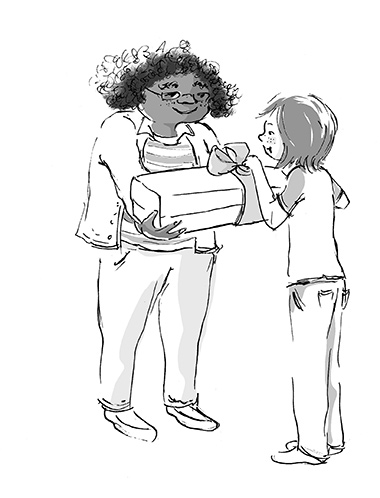
I untie the ribbon
and open the box.
And for the second time
in two days,
I burst into tears.
There, nestled in tissue paper,
is a foot-long memento baseball bat.
It says
PHILLIES WORLD CHAMPIONS
2008.
Mrs. Harden grins.
“I was going to give it to you
for your birthday.”
I hug the bat to my chest.
“This is birthday and Easter
and Christmas
for the rest of my life!”
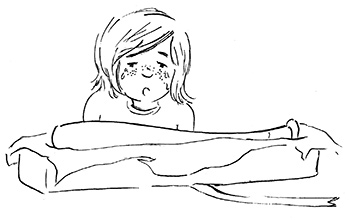
Later,
Alison and I are sitting
on the front porch.
I’m reading to her
the first chapter of
Black Beauty,
which Ms. Mott recommended to me
since it was written in the 1800s.
Reading aloud is one way
I try to get Alison into a book.
Alison inspects her nails,
flaps at a fly,
yawns.
“I’m bored,” she says.
I give a sigh.
“How can you be bored?
I just started. Besides,
don’t you want to be an actress?”
Alison shrugs. “Yeah—so?”
“So actresses have to read scripts.”
She snorts. “I know that.
When I was in the school play,
I not only read the whole play—
I memorized it.”
“I rest my case,” I say. “You do read.”
“Only plays I’m in.”
“Just let me finish this chapter.”
Alison gives me a wicked grin.
“Can’t. Here comes Gilbert,
your not-boyfriend.”
Gilbert isn’t here for me.
“Is your dad around?”
he asks.
“Mr. Kim’s lawn mower
won’t start.
I can’t figure out
what’s wrong.”
Dad loves tinkering
with lawn mowers.
There are four in our garage.
Only one works.
The others Dad got at yard sales.
They don’t run now, but they will.
And once they work,
he’ll give them away
and buy more.
Mom calls it
Dad’s “harmless addiction.”
Like hers with books.
Dad has worked on
Mr. Kim’s lawn mower before.
Mr. Kim, who recently retired
from NASA,
always jokes with Dad.
He says: “I can send a man
to the moon, but don’t ask me
to fix a lawn mower.”
Dad comes out to the front porch.
Parker too.
Gilbert gives Parker a friendly punch
on the arm.
“Nice cape, buddy,” he says.
Parker eyeballs Gilbert’s watch.
“Nice watch.”
“Thanks. I got it at Trader Bill’s.”
Parker lowers his voice to a whisper.
“Be careful with that watch.
There’s robbers in town.”
Alison shoots me a look.
I ignore her.
Gilbert tilts his head,
reads my book title.
“Black Beauty, huh?
Any good?”
“Just getting started,” I say.
“Well, you can tell me
how you like it
over ice cream,”
he says.
He winks at me.
“Someday.”
Alison jabs me
with her elbow,
hisses under her breath:
“Aha!”
I decide to clean the kitchen
for when Mom comes home.
Dad’s great with lawn mowers
and grilled cheese sandwiches
and history
and lots of other stuff.
But cleaning—forget it.
Parker wants to help.
He stands on a chair
to wash Dad’s coffee mug
and topples over.
Next he drops the sugar bowl.
Then he steps on my foot.
“Time to go play,” I tell him.
He stomps off.
“Play, play, play—that’s all I do.”
A familiar voice replies:
“What a tragic life you have, Parky.”
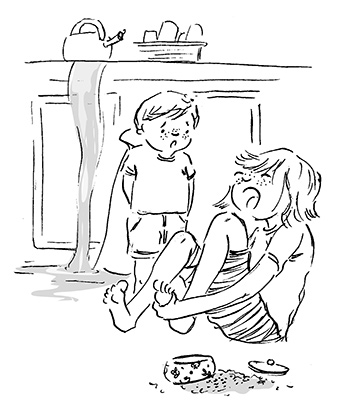
I scream—
“Mom!”
I race into the hall.
I throw my arms around Mom’s neck.
“I thought you weren’t coming home
until tomorrow night.”
Mom tucks a strand of hair
behind my ear.
“Oh, sweetie, I missed you all so much.”
Early Saturday morning
Dad calls:
“Who wants to
go to the Pancake Palace?”
My eyes pop open.
Chocolate chip pancakes—
one of the best foods
ever invented.
I’m dressed and ready to go
in two minutes.
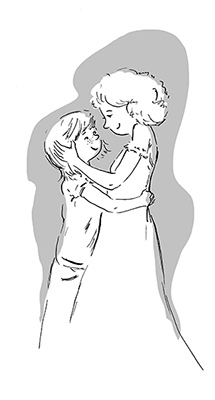
The waitress hands us our menus.
They’re so big that Parker—
who can’t read but pretends he can—
totally disappears behind his.
But not before the waitress says:
“Hey—aren’t you the little boy
who called 911?
The little hero?”
Grandma Fludd has sent gifts
home with Mom:
A fountain pen for Dad.
(He uses ballpoint.)
A box of cactus candy for Parker.
(He takes one bite and spits it out.)
And for me—
oh no—
a pair of earrings.
Clip-ons
shaped like saguaros.
I roll my eyes.
Mom tells me: “Sit tight.
I’ll be right back.”
Mom comes back
with a cardboard box.
She pulls stuff out:
A Tommy Tool screwdriver.
A pair of brown mittens
as wide as waffles.
A fan with the logo
of Frawley’s Funeral Parlor
on the front.
A pin in the shape of a crab.
A pair of ballet slippers.
I gape. “I didn’t know you took ballet.”
Mom laughs. “I didn’t.”
“Then what—”
Suddenly it dawns on me.
“Grandma Fludd gave you
this junk,” I say.
Mom shakes her head.
“Not Grandma Fludd.
And absolutely
not junk.”
Mom tells me about Grandma O’Dell.
Grandma O’Dell was Grandma Fludd’s mother—
and therefore my mom’s grandmother.
My great-grandmother.
“She was wonderful,” Mom says.
“She took me to afternoon tea
at fancy hotels.
We both wore hats and gloves.
She taught me Broadway show tunes.
She took me to New York City twice
on the train.
But, oh my, she gave the oddest presents.”
“Must run in the family,” I say.
“I threw a lot of the stuff away,” Mom says.
“But some I dumped in this box.”

“I don’t blame you.”
“Then last week Grandma Fludd found the box
in her storage bin and gave it to me.”
“How come you didn’t ditch it at the airport?”
Mom’s eyes get shiny.
“Because you don’t ditch your treasures.”
Mom tells me she would give anything
“to be having tea with Grandma O’Dell again,
opening odd little gifts:
a Daffy Duck change purse,
a pig made of tiny seashells …”
I interrupt:
“A pair of clip-on earrings
shaped like saguaros?”
I take my black dress shoes
(which I hardly ever wear)
out of their box.
I line the box with tissue paper.
I put the clip-ons in the box.
Also the comb shaped like an alligator
that Grandma Fludd sent me for Easter.
And the plastic jelly beans.
“This is my treasure box,”
I tell Ottilie.
“From my grandmother.”
Ottilie swims to the surface,
puckers her mouth.
That’s Ottilie-speak for
“Where’s my fish flakes?”
After church on Sunday,
Mrs. Harden invites me over
to work on her 1,000-piece puzzle.
She’s got a card table
set up in her living room.
Puzzle pieces lie in heaps
in each corner.
“You work that side, Suzy,”
she tells me.
The picture on the puzzle box
is of three crows
sitting on a clothesline.
I tell Mrs. Harden how
Mrs. Bagwell chased after
that crow with her flyswatter.
Mrs. Harden says: “Lucky for her
that crow didn’t swoop down
and land on her head.”
Now that’s a puzzle picture
I’d like to work on!
An hour is about all we can take
of puzzle-making.
We stop for lemonade.
Mrs. Harden asks about Grandma Fludd.
I tell her Grandma Fludd is doing fine.
I tell her about the saguaro earrings
and my new treasure box.
Mrs. Harden grabs my hand.
“I have a treasure box too.
Come see!”
Mrs. Harden’s treasure box is not a box at all.
It’s a small trunk in her spare room,
and it’s filled:
Her own baby quilt, hand-stitched by an aunt.
A Little Lulu doll.
Three packets of letters tied with string.
A stack of report cards.
(Mrs. Harden was a straight-? student.
I’m straight ?—except for my A in English.)
A navy blue sweater Mrs. Harden knitted
for her husband on their first anniversary.
The wooden bird I painted for her when I was six.
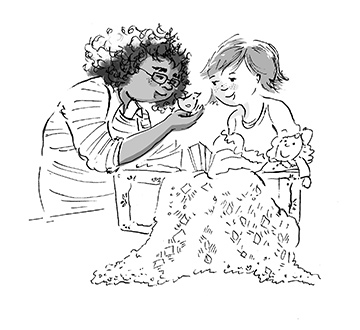
Her father’s old deflated football.
A white dress with a lace collar.
“Is that your wedding dress?” I ask.
“No,” says Mrs. Harden. “I was married
in a gray suit. This dress belonged to
my mother. She wore it to her
high school graduation.”
“It’s very pretty,” I say—even though
I’m not a fan of dresses.
I can’t remember the last time I wore one.
Mom works for Dr. Ellis,
former dean of Ridgley Community College.
She’s his part-time personal assistant.
This morning she’s about to go over to his house.
Parker whines to go along.
Sometimes Mom takes him.
Dr. Ellis lets Parker build forts and firehouses
with his many hundreds of books
as long as Parker promises
to be careful with each one.
Dr. Ellis says that’s how he came
to love books,
by building walls and castles
with his own father’s collection.
Mom tells Parker: “Not today.”
Parker flops onto the floor.
He rolls.
He kicks his feet in the air
like a bug.
He shrieks.
Until I say:
“What kind of superhero does that?”
Later, Parker’s friend Franky
invites Parker over to play.
Dad has a class to prepare.
Mrs. Harden is off to
her doctor’s appointment.
Alison is at her hip-hop lesson.
I decide to wash my bike.
Gilbert walks past.
I call out: “Hey, Gilbert.”
“Hey, Suzy.”
I want to tell Gilbert
I don’t believe for one second
that he took Mrs. Bagwell’s ring.
I want to tell him I miss the whistling.
I want to tell him I snipped some
of the mint he gave to Mrs. Harden
and am rooting it in a jar
on my windowsill.
But ever since Alison
made a joke about me liking Gilbert
as a boyfriend,
I’ve gotten a little shy around him.
And neither of us has mentioned
ice cream lately.
When Mom comes home from Dr. Ellis’s,
I tell her I’ll need a bag lunch
for Tween Time tomorrow.
She tells me there’s egg salad in the fridge.
Of course I can make my own lunch.
My dinner too.
But Mom was in Arizona for weeks,
and I’m kind of in the mood
for a little pampering.
Then Parker hops onto Mom’s lap.
“I want Smileys,” he says.
Smileys are oatmeal cookies
with happy raisin faces.
“I’ll make some tonight,”
Mom tells him.
“Anything for the little hero,”
I say under my breath.
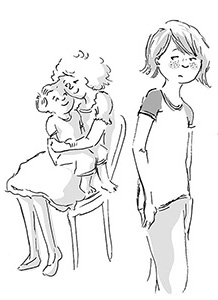
The Tween Time plan for the day
is a “surprise” field trip.
Alison and I bring permission slips
and bag lunches.
Ms. Mott collects our lunches
in a big wicker basket.
She jabs at the air with
her closed parasol.
“Off we go,” she says,
still not telling us where we’re going.
Alison groans. “It’s a picnic.
I hate picnics. All those bugs.”
“It’ll be fun,” I say.
The boy asks Ms. Mott:
“Where are we going?”
“To Old Elm Cemetery,” Ms. Mott says.
Alison hisses in my ear. “Cemetery? Fun?
Did you say fun?”
I say: “Okay … interesting.”
Old Elm Cemetery
is a fifteen-minute walk
from the library.
Dad has talked about it,
but I’ve never been there
till now.
It’s pretty, really.
Old trees.
Tall hedges.
Flowering bushes.
Mossy marble stones.
Ms. Mott spreads
a red-checkered tablecloth.
We sit in a circle
eating our lunches.
Alison swats a bee
from her cupcake.
Ms. Mott tells us
how people in the 1800s
used to picnic here,
because there weren’t
many open spaces
for the public back then.
A cemetery was like a park.
She says: “Some people came
just to be near loved ones
who had died.
They found it comforting.
Some people came
just for the quiet.”
Suddenly
Alison shrieks:
“Holy tamales!
I think
I just bit into a bug!”
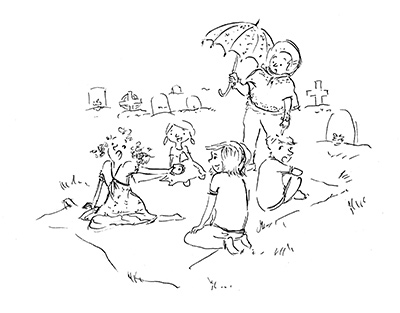
On the way home,
Alison hooks her arm
into mine.
“I know I’m a pain.”
I don’t say anything.
“A first-rate complainer.
Don’t deny it, Sooze.”
I don’t deny it.
“It’s in my DNA.
Blame my aunt Gertrude.”
Silence.
Alison turns, gives me
a big hug.
Right there
on the sidewalk.
“Thanks for putting up
with me,” she says.
You gotta love her!
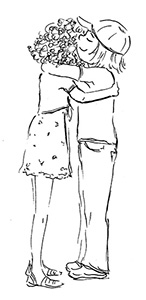
Dad asks if we tweens
walked around the cemetery,
if we looked at headstones.
“No,” I say. “We just had a picnic.”
Dad says: “Maybe you and I
can go for a walk around Old Elm
someday. Check out
the headstones.”
The part about
looking at headstones
sounds pretty depressing.
But I do like the part about
me and Dad doing something
together.
Just us two.
Without
the little hero.
On Wednesday morning,
Mrs. Harden calls
to see if I want to
help her make
a gingerbread cake
for Gilbert.
Today is his birthday,
and gingerbread
is his favorite.
Mrs. Harden measures the flour.
I crack eggs,
pour molasses.
Ginger
and cloves
and cinnamon
go into the bowl.
I used to like licking the bowl
until Alison told me
raw batter
can kill you.
While the cake is baking,
I make Gilbert a card.
Red and white
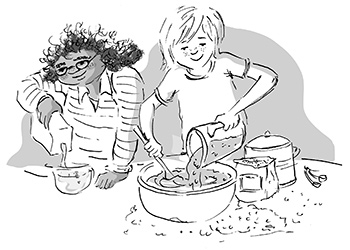
with baseball stickers,
because Gilbert likes the Phillies
almost as much as I do.
I print HAPPY BIRTHDAY inside—
though how happy can it be
with a dad who drinks too much
and a neighbor who thinks
you are a thief.
The cake is finished.
Mrs. Harden dusts it
with powdered sugar.
She puts it in her cake carrier.
She asks me to bring
Gilbert’s present along.
It’s a Phillies T-shirt
in a Phillies backpack,
and doesn’t the card
I made for Gilbert
go perfectly.
I’d never been to Gilbert’s house.
We drive ten blocks.
I expected a small house—
maybe with Gilbert’s dad
drinking beer and slouching
on an old lawn chair.
But there’s no sign of
Gilbert’s dad.
As for the house,
I was right.
It is small.
But there’s something
I didn’t expect:
it’s also very
pretty.

I tell Ottilie
about Gilbert’s house.
About the blue shutters
and window boxes
dripping pink petunias.
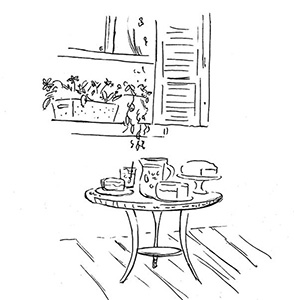
I tell Ottilie
about the wind chimes
twinkling.
The brick patio
Gilbert built himself
with bricks from
the old print shop.
I tell Ottilie
how Gilbert’s mom
brought us iced tea
with fresh mint
from her herb garden.
And how she served the cake
on flowered plates—
so what if they didn’t match.
I tell Ottilie
how glad I am
that Gilbert’s life
isn’t just about
his dad’s drinking.
Or not having much money.
Or Mrs. Bagwell
saying bad things about him.
It’s also about his nice mom.
His pretty house.
And his friends sharing
homemade birthday cake
on a patio he built himself.
That I find myself
thinking about
Gilbert.
A lot.
Like a big brother?
I ask myself.
Not really.
How about a cousin?
Nope.
Or a special friend?
Getting close.
A very special friend?
BINGO!
All of a sudden
everyone is thinking about
Ridgley’s Fourth of July parade—
which will be on July 3 this year
because the Fourth falls on a Sunday.
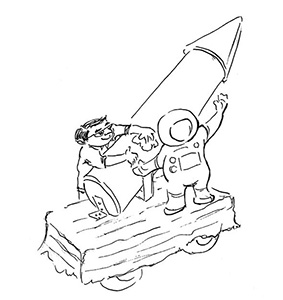
Mr. Capra says
he and the people he works with
are putting together a bike brigade—
streamers and flags,
fancy baskets and bells.
Mr. Kim is refurbishing
his float from last year,
patching the rocket with aluminum foil,
blowing up another yellow beach-ball moon,
repainting the clay astronauts.
Ridgley High’s marching band
is practicing on the football field.
Mr. Ellis has Mom dust off
his George Washington costume.
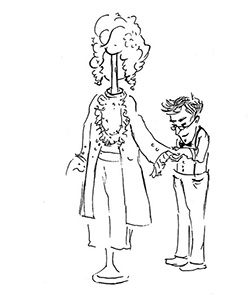
Alison and I are signed up
to walk with the Ridgley Library group.
We’ll wear T-shirts that read
I LUV MY LIBRARY.
And Parker,
the little hero,
gets to ride in Mayor Paloma’s
cool blue convertible
with the top down.
Mom tries to take Parker’s ratty old cape.
Parker clutches it around his neck.
He howls.
“You don’t need a cape
to be a hero,” Dad tells him.
More howling.
“It’s ripped,” I say. “And it smells yucky.”
Parker holds his nose.
“You smell yucky, Suzy Poo-poo,” he says.
Mom wheedles. “Now, Parky, what if we get you
a new cape? Something really nice for the parade?”
Parker stops clutching. He sniffles.
“Will it have blue stars?”
Mom nods. “If you want blue stars.”
“When?” he asks.
“In a couple days.”
“Okay,” he says. “But I’m wearing
this one till then.”
Later, Mom sneaks it off him
when he’s sleeping.
She throws it in the trash can.
Mom gets Mrs. Capra—
a master quilter—
to make the new cape.
“Lots of stars!” says Parker.
“You got it,” says Mrs. Capra.
Next Parker decides he wants
a haircut.
Dad takes him to the barbershop.
Then Mayor Paloma’s assistant calls
with instructions:
“Bring the boy to the mayor’s office
at nine a.m. sharp on the day
of the parade.”
The parade doesn’t start till ten,
but there’s going to be
a brief ceremony first.
Parker will get a medal.
There will be photos with the mayor.
It seems as though
the whole parade
is about Parker.
Oh well—my birthday
is coming up,
and Dad is going to take me
to a Phillies game.
Good seats … hot dogs …
root beer … rally towel …
maybe even an autograph
or two.
On July 15.
At least I’ll be a star
that day.
I’m walking home from Alison’s.
She wanted us to make fancy headbands
to wear in the parade tomorrow.
Suddenly the sky goes dark.
Lightning flashes.
Fat drops of rain fall.
I start to run.
Old newspapers fly past.
A trash-can lid clatters by.
Now it’s pouring, and I’m soaked.
I can’t see ahead.
Through the howling wind, I hear my name.
I move toward the voice—
It’s Mrs. Bagwell standing at her door.
“Hurry, Suzy! Come inside!”
I make it to her doorway.
Then the whole earth shakes.
My ears pop, and it feels like
the end of the world
as Mrs. Bagwell and I leap
into her hall closet
together.
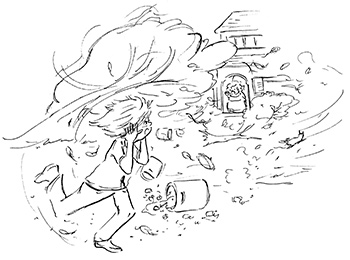
It was not the end of the world.
It was the sixty-five-foot evergreen
in Mrs. Bagwell’s backyard
uprooting and crashing down
just inches from the house.
It was not the end of the world,
but it could have been
for me and Mrs. Bagwell
if the angle of the tree-fall
had been the least bit different.
It could have been
the end.
“I heard about the tree,” he says.
“Are you okay?”
I give him a thumbs-up.
“Thanks to your friend Mrs. Bagwell.”
“So I guess it’s true.” He smiles. “There’s
good in everyone.”
“Where were you in the storm?” I ask.
“At home,” he says. “Eating ice cream.”
We both laugh.
We sit there on the porch
just talking,
being.
The trees glisten green.
I’ve never seen
trees so green.
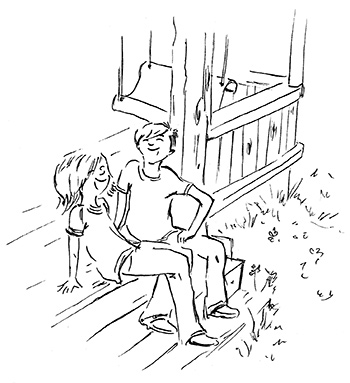
Parker is so wound up
before the parade
that he throws up
his cornflakes.
Twice.
Mom is so excited
about meeting the mayor
that she heads out the door
with two different shoes on.
Alison does my hair
with the fancy hairband.
She keeps saying:
“I can’t believe it! You were
almost crushed to death!
By a Christmas tree!”
A zillion people
drive past Mrs. Bagwell’s
famous fallen evergreen.
Some try to take photos.
Some succeed.
Some she chases off
with her flyswatter.
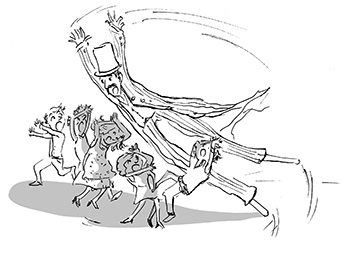
The parade goes fine
except when
Uncle Sam on stilts
topples over into the crowd
and sprains his ankle.
Oh, and when Paco the Parrot
squawks a stream of
bad words.

It’s an odd sort of day.
Alison blames it on the storm.
“Something’s in the air,” she says.
“I can smell it.”
I give her a look. “I can smell it too.
You’re wearing too much perfume.”
Parker wears his cape
and his medal from the mayor
to church.
Pastor McCleary actually mentions
Parker in his sermon.
All day Parker flashes the medal
in our faces.
He even goes into my room
to show off
to Ottilie.
At the fireworks
Parker struts around our blanket
flashing his medal,
flapping his cape.
Twice Mom tells him
to “please sit down.”
But there’s such a smile
in her voice
he totally ignores her.
I really don’t know
how much more
of this little hero stuff
I can take.

On Tuesday
on the way to Tween Time
Alison is all bubbly with
guess-whos
and guess-whats.
“Guess who really stole
Mrs. Bagwell’s ring?”
“Guess what Mrs. Bagwell
is doing now?”
“Guess what you and I
are going to do this Friday?”
I hold my hand up. “Whoa!
One guess at a time, please.”
“A crow!” Alison tells me.
She jabs her finger at me and repeats:
“A crow!”
I think Alison is getting goofy.
“Crows steal jewelry?”
“Yes!” she says. “The tree guy
found the ring in a crow’s nest
when he was sawing off the branches
of Mrs. Bagwell’s tree.
There it was all shiny—
couldn’t miss it.”
“And he gave it to Mrs. Bagwell?” I ask.
Alison grins. “Honesty is alive and well
in good old Ridgley.”
“But how—?”
“Seems Mrs. Bagwell was wearing
the ring last spring.
She took it off to pick up a clump
of muddy leaves.
She set it on her patio table.
A crow must have spied it.”
Of course at the bottom
of it all,
I couldn’t care less about
crow, nest, or ring.
“What about poor Gilbert?” I ask.
Alison grins again.
“I’m coming to that.”
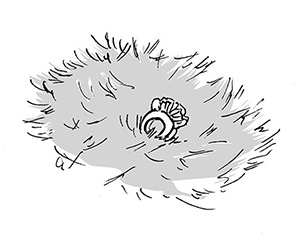
“Well,” she says, “Mrs. Bagwell was
so embarrassed about accusing Gilbert
that she drove right over
to his home and apologized.”
“Really?” I say.
“Really!
And she told Gilbert
to go to Ernie’s Bike Shop
and choose any bike he likes.”
I shake my head.
“Are we talking about
our Mrs. Bagwell?”
“You bet,” says Alison. “And
my dad heard she is going to
put an ad in the Ridgley Post
that her misplaced ring
has been found.”
“Sounds like Mrs. Bagwell
is a changed woman,” I say.
Alison snorts. “Not totally.
Earlier, I saw her chasing
the Kims’ cat with her fly swatter.”
When we get to the library,
Ms. Mott waves us through the door.
There’s no time to ask Alison
about what she’s planning for us
on Friday.
Just as well.
It’s probably something
I’m going to hate.
Like getting our nails done.
(Alison’s cousin Tara
likes to practice on us.)
Or making bracelets
with Alison’s bead kit.
Or Alison trying to teach me
her latest hip-hop routine.
Pictures are tacked up
all around the Bennett Room,
pictures of famous people
from the 1800s.
Ms. Mott points to each one:
Abraham Lincoln—president of the United States.
Florence Nightingale—nurse.
Sarah Bernhardt—actress.
Edgar Allan Poe—author.
Harriet Tubman—”conductor” of the Underground Railroad.
Emily Dickinson—poet.
Chief Joseph—chief of the Nez Perce Nation.
Annie Oakley—star of Buffalo Bill’s Wild West show.
Frederick Douglass—leader in the abolitionist movement.
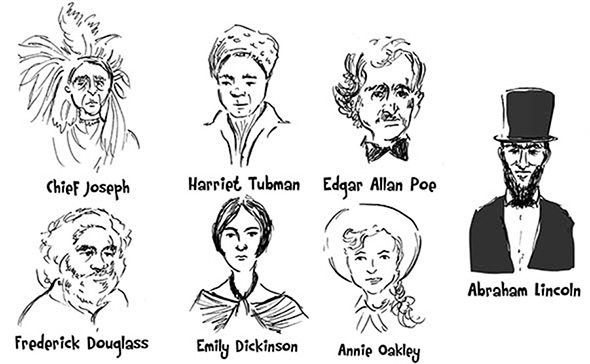
Ms. Mott instructs us to choose
the person we’d like to learn more about.
Alison elbows me. “Learn,” she growls.
“What is this? School?”
“Shhh,” I say.
Ms. Mott goes on. “Once you’ve decided,
you may choose a few books from the back table
about that person.”
Alison mock-cheers. “Yippee.”
“And next week,” says Ms. Mott, “we’ll each come
dressed as our favorite, ready to share
what we’ve learned.
Alison leans over and whispers: “Next week
I’m going to be sick with one of those 1800s diseases.
What were they—typhoid fever? Gout?”
But when Ms. Mott asks Alison about her choice,
Alison replies all nice and polite:
“Sarah Bernhardt, Ms. Mott. The actress.”
Ms. Mott pats Alison on the head.
“Why am I not surprised?”
I don’t know what draws me
to Emily Dickinson.
I’m more the Annie Oakley type.
But it’s something about
Emily’s face—
her eyes, I think.
She looks so content.
And her hands—
so graceful and relaxed.
“I’ll be Emily Dickinson,”
I tell Ms. Mott.
Ms. Mott sends me a smile.
“Good choice, Suzy.”

I take three books
about Emily Dickinson
from the table.
When Alison goes
to the ladies’ room,
I skim a few pages.
I read that Emily
had a talent
for the piano.
She called it “moosic.”
As she got older,
she stopped going places.
She even hid from guests
who came to the house.
She carried on her friendships
by letter.
She wore only white dresses.
Not exactly my kind of chick.
On the way home,
all Alison does is
complain.
“No way am I going to read
an entire book
on summer vacation.”
“Just skim it,” I tell her.
She ignores that. Keeps whining.
“And a report!
Is Ms. Mott joking?
That’s homework. Homework! In July!”
“You don’t have to give a long report,”
I say. “Just a little something about
your person.”
“Let’s just quit Tween Time.”
“No way,” I tell her. “I like Tween Time.”
Then, to change the subject, I ask:
“So—what’s this about Friday?
What are you and I going to do?”
Her sour face brightens. She claps her hands.
“We’re auditioning for a play!”
The next day,
Alison and I go to
the Ridgley Community Theater.
The sign on the door says:
WANTED:
ACTORS AGES 10 TO 13
TO PERFORM IN UPCOMING PLAY
THE FOGGY BOG MURDERS.
AUDITIONS FRIDAY, JULY 9
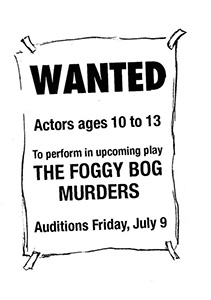
I tell Alison: “I can’t audition
for a play.”
“Why not?”
“I wouldn’t know what to do.”
Alison drapes her arm around me.
“I’ll tell you what to do.”
“Besides,” I say, “I don’t want to
be an actress. You do.”
“Maybe you do too,” says Alison.
“You just don’t know it yet.”
We go to Alison’s.
Up in her room
she digs through some papers
and comes up with
the script from
last year’s school play,
Snow White in the Big City.
Alison played the lead—
Snow White.
I was stage crew.
She plops on the bed
beside me.
“We’ll practice with this,” she says.
“I’ll be Snow White.”
“Of course.”
“You’ll be the witch.”
“Of course.”
So it’s set.
For the audition we will do
a scene from Snow White in the Big City.
Alison tucks her blond curls
under the old Snow White wig.
The witchiest thing she can find for me
is an old black T-shirt of her father’s.
There’s a hole under one arm.
We sit back on the bed.
We turn pages to the part where
the witch—posing as a waitress—
tries to get Snow White to order
the poison-apple Danish.
I read my line: “This Danish is delicious.
You must try it, my dear.”
Alison—as herself—screeches: “No! No! No!
You’re supposed to be a witch. You sound like
that nice waitress at Daisy Donuts.”
“Well, aren’t I a waitress and a witch?”
Alison looks at the ceiling, then back at me.
“You’re mainly a witch. You have to sound like a witch.”
Alison demonstrates. Her voice turns sinister:
“Zees Danish eez dee-lizzious. You muuuzzt try eet.”
She goes on: “Then you cackle. Like this—
HEE-HEE-HEE-HEE-HEE!”
“Do I have to cackle?” I ask.
Alison smacks her forehead.
“Yes, you have to cackle.
Witches cackle.
You’re a witch.
You cackle.“
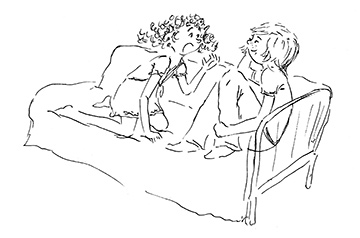
Dad likes that I am learning
about Emily Dickinson.
At dinner, he tells a story
about Emily’s father,
Mr. Dickinson—
who left the house
in his underwear one night
and woke the entire
neighborhood
with church bells
so that the people could see
the northern lights.
“Whew!” I say.
“With a dad like that,
no wonder Emily
didn’t want to
leave the house.”
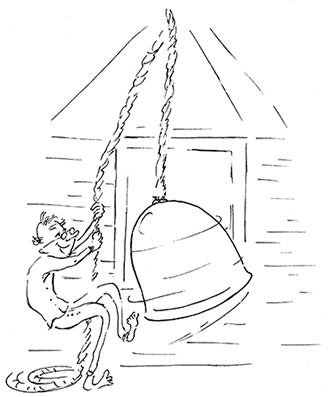
After dinner,
I practice my cackling
on Ottilie.
She hides behind
her sunken treasure chest.
Mom calls upstairs:
“Suzy Q, what’s going on?
Are you laughing or crying?”
“Neither,” I call down.
“I’m cackling.”
There was a time—
not so long ago—
when Mom was actually
interested in me
and would have walked upstairs,
poked her head in my door,
and asked me why
I was cackling.
Now
she stays downstairs,
all busy baking more Smileys
for Hero Boy.
Before bed,
I choose an Emily Dickinson poem
to read to Ottilie.
It’s the one that begins:
“Ah, Moon—and Star!
You are very far—”
Those are the only two lines
of the poem I understand.
Ottilie swims to the other side
of her tank.
I think she agrees with me.
I tell her to do
what my English teacher,
Mr. Ranft, told us:
“When you don’t understand
the words of a poem,
just let the sounds wash over you.”
Easier for Ottilie since she lives
underwater.
That night I dream
I am Emily Dickinson.
The moon is far.
The stars are twinkling.
I peek at them
through my curtain.
I am wearing a white gown.
I sit at the piano that
is in my room.
I play beautiful
“moosic.”
People from all over Ridgley
gather in the front yard.
Dad goes out on the porch
in his underwear
and thanks them for coming—
“But my daughter
doesn’t receive visitors,”
he says.
Gilbert is in Mrs. Harden’s driveway
on his new bike—
a silver Schwinn Corvette
with black trim.
I go over to admire it.
“Cool,” I say.
Gilbert grins, then says:
“Want to ride bikes over to
Ridgley Park?”
“Darn,” I say. “I can’t.
Alison and I are going to
practice our parts.”
“Parts?”
“We’re auditioning for a play
together.
On Friday.”
Gilbert gives me a thumbs-up.
“Good luck.”
He starts to pedal away,
leaving me alone with the day,
one of those perfect July days:
breeze,
smell of fresh-cut grass,
sky blue as poster paint.
I pull out my own bike,
hop on,
pedal hard.
I catch up with Gilbert in the park.
He and his new bike are leaning against a tree.
“Hey,” I say.
Gilbert looks up. “Hey, Suzy. I thought you
were going to Alison’s.”
“I’ll go later,” I tell him.
I get off my bike and sit on the grass.
Gilbert sits next to me.
“My birthday’s coming up,” I say.
“July fifteenth.”
Gilbert grins. “Thanks for the heads-up.”
I laugh. “I’m not fishing for a card or present.
I’m just saying that my dad’s taking me
to a Phillies game.”
As soon as the words are out of my mouth,
I regret them.
I’m pretty sure Gilbert’s dad
would never take him to a game.
So I’m shocked when Gilbert tells me
his dad took him last fall—
to see the Phillies play the Atlanta Braves.
What pops in my head next is:
I thought your dad had a drinking problem.
Of course I know better than to say
everything that pops into my head.
Instead I ask: “So—did you get any autographs?”
Gilbert and I sit for a while
pulling blades of grass.
Then I tell him
how annoying it is
when your little brother
is a hero.
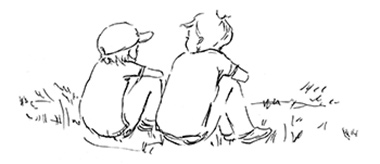
And Gilbert tells me
how much he misses
his best friend, Luis,
who is spending the summer
with cousins in New York.
And I tell Gilbert
how nervous I am about
trying out for the play.
And he tells me
how worried he was
that Mrs. Bagwell’s ring
would never turn up.
And I tell him
how much I missed
his whistling.
And he tells me
how much he appreciated
that I never treated him
like a thief.
And we both laugh about
Mrs. Bagwell’s
dreaded green flyswatter.
And then we just sit there
on the grass
not saying much of anything.
When I finally get to Alison’s,
she is hopping mad.
“Where the heck were you?” she growls.
“Riding my bike,” I tell her. “Talking
to Gilbert.”
Alison shoots me a glare.
“I knew it!”
“Big deal,” I say. “I’m only ten minutes late.”
“Ha!” Alison snorts. “Tell that to
the director on Friday.”
“I won’t be late on Friday.”
“Well, if you are,” she says, “you can
kiss this friendship goodbye.”
I give one of Alison’s curls a tug.
“I said I won’t be late.”
“Fine,” she says.
“Fine,” I say.
Alison and I practice our lines.
I try two kinds of cackling.
“Go with the first cackle,”
Alison tells me.
Then she takes a fake bite
of the fake Danish
and fake faints
while I cackle—
over and over
and over again.
Finally
she pronounces us
ready for the audition.
She tells me to go home,
eat protein for dinner,
and get a good night’s sleep.
“Rest my cackle,” I say.
She almost grins.

Mom is in one of her fogs
this afternoon.
She started looking up a recipe
for spinach ravioli
and ended up reading
half the cookbook.
So it’s plain cheese omelets
for supper.
Protein.
Alison will be pleased.
I make my announcement
over dessert.
“I’m going to audition tomorrow.”
Mom’s spooned rice pudding
stops midair.
“Audition?”
“Me and Alison,” I tell her.
“At the Ridgley Community Theater.”
“You never said a word,” says Mom.
“Remember all the cackling?”
Dad’s eyes boggle. “You’re auditioning
to play a chicken?”
Later, Mom asks me what I’m going to wear
for the audition.
I show her Mr. Wilmire’s old black T-shirt.
She wrinkles her nose. “I can do better.”
She pulls a dress from the back of her closet.
It’s satiny black.
Mom sighs. “It’ll never fit again.
You may as well get some use out of it.”
I try it on.
I look more like a witch.
I start to feel more in character.
I start to believe the audition will go well.
I start to imagine what people will say about me
when they hear I’m in a real play.
I go to my room, stand in front of the mirror.
I practice a pose for when
the Ridgley Post photographer comes
to take my picture.
Alison and I walk into the theater.
She says her stomach is all butterflies.
She says that’s a good thing.
My stomach is more like
crows in a tornado.
Not good.
I quickly run to
the ladies’ room.
A guy in jeans and a tie-dyed shirt
writes down our names and ages.
He tells us where to sit—
row 10 with eight other kids,
three of them boys.
There are some grown-ups
in row 11.
Parents, I think.
The woman in row 3
stands up, faces us.
“Hi, everyone,” she says.
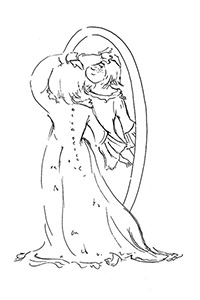
“I’m Giselle. I’m the director.”
She starts bringing kids onstage
one at a time.
Most read from a script.
One boy has his lines memorized.
A girl in purple recites a poem.
Alison and I go last.
Alison tells the director
we are going to do a scene together.
“Sure,” says Giselle. “But do the scene twice
so I can focus on one of you at a time.”
It’s hard to tell, but I think
things went better the second time around.
Especially my cackle.
I wonder which of us
Giselle was watching then.
Afterward,
Giselle gathers us all in a side room.
She applauds.
“Bravissimo!” she goes. “Good job, actors.”
Then she leaves.
The guy in jeans and tie-dye
tells us they will be casting four kids—
two girls and two boys.
“When can we expect a call?” asks a parent.
“Sometime Tuesday,” says the guy.
He thanks us. He gives us a thumbs-up.
“Good job, people.”
Alison pokes me in the ribs, whispers:
“He’s looking right at us!”
With the audition over,
I can focus on my
Emily Dickinson project.
I start reading the first book
about her.
But my mind keeps wandering
back to how it felt being onstage.
To Giselle using her first name
with us kids like we were
real theater people.
To the guy in jeans and tie-dye
looking straight at me and Alison.
The phone rings.
Even though it’s not Tuesday,
my heart does a flip.
Mom calls to me:
“It’s Mrs. Harden. She wants you to
go over for a minute.”
Mrs. Harden wants to move her desk
closer to the window.
“Think we can do it?” she asks.
“Sure,” I say. “It’s not that heavy.”
I flex my arm muscle.
After the desk is in place,
we sit down to iced tea and cookies.
(No raisins.)
I tell Mrs. Harden about the audition—
how well I think it went,
how wearing Mom’s black dress
got me more into character.
“Now I need to focus on being
Emily Dickinson
for Tuesday’s Tween Time,” I say.
Mrs. Harden has an idea.
“Think of Emily as a role you’re playing.
Dress the part as you’re reading about her.
Try to get into the poet’s head and heart.”
I like that.
“But I don’t have a white dress,” I say.
Mrs. Harden grins. “I do.”
I’m a little nervous about taking
the white dress that
Mrs. Harden brings me.
It’s the one from her treasure chest—
her mother’s high school graduation dress.
Mrs. Harden says her mother would
have loved the idea—
a young friend wearing it as part of
a project on Emily Dickinson.
“Mother loved poetry,” she says.
Funny how a dress can change
how you feel.
When I wear Mom’s black dress,
I feel more like the witch in Snow White.
Now, slipping into Mrs. Harden’s white dress,
I feel kind of like Emily Dickinson,
more able to focus on her life.
I stand in front of the mirror.
I turn, swishing.
I swish over to Ottilie’s tank.
“Want to learn about Emily Dickinson?”
I say.
Ottilie swishes her tail.
That has to mean yes.
I start reading about Emily.
Aloud.
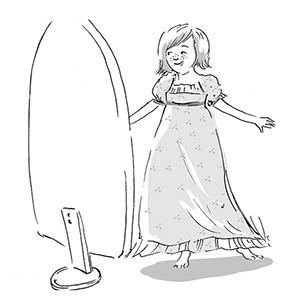
All weekend I work on
my Emily Dickinson report.
I’m down to two poems.
Which shall I read?
“I’m nobody!
Who are you?”
or
“Hope is the thing
with feathers.”
“I’m nobody” is probably
more famous, but it’s
kind of a downer.
I don’t want to depress
the audience.
I’ll go with “Hope.”
On Monday morning,
I hear Parker yelling outside.
Cape flying—he’s chasing after
Shady the cat.
I see the cat scoot under
Mrs. Harden’s porch.
“Why are you chasing the Kims’ cat?”
I ask.
Parker scowls. “I think that cat
caught a mouse.”
“That’s what cats do,” I tell him.
“But I saved Mousey!”
“You did?”
“Yeah. I scared that cat and
I helped Mousey get away!”
I pat Parker on the head. “Good for you.”
“Just doin’ my job,” he says, flapping off.
Alison comes over after lunch.
She opens her suitcase
and shows me her Sarah Bernhardt costume:
Blue dress with ruffles and puffy sleeves.
Three long strands of plastic pearls.
Her Snow White wig.
(Miss Bernhardt had dark hair.)
And a wide-brimmed navy blue hat
with a peacock feather.
“Wow!” My eyes go wide. “I know where
you got the wig—but what about the rest of the stuff?”
Alison grins. “Borrowed it from the Ridgley
Community Theater.
They have a great costume closet.”
“They actually let you take something from it?”
“I told them it was for a project—community service.”
“Bull,” I say.
“Hey, I’m part of the community.”
Dad’s in the garage
tinkering with a lawn mower.
I’m in the living room with Mom,
reading about Emily Dickinson.
Suddenly Mom screams.
Parker comes running.

Mom points a trembling finger.
“Sp-spider—”
It’s sitting on the stack of newspapers—
smack on Parker’s picture,
on his nose.
Parker puffs his little chest.
“Don’t worry, Mommy. Hero Boy
will save you.”
He lifts the top section of the paper
and carries the spider out the front door.
I hope he remembers Dad said, Don’t kill spiders.
They eat other bugs.
Parker does remember.
He dumps the spider over the porch railing
onto the grass.
Then he stands posing by the front door.
He looks up and down the block.
He says: “Today I saved Mousey.
And Mommy. And a spider.
Where’s that newspaper lady?”

I feel kind of sorry for Parker.
The newspaper lady has
more important things
to write about now.
Nobody wants to read about
spiders and mice.
Parker can flap around
in his cape
and save every mouse
and spider
in Ridgley,
but his fifteen minutes
of fame
are over.
And now it’s
my turn.
Probably a part in the play.
I bet that reporter will be there at
The Foggy Bog Murders
on opening night.
And of course—
my birthday.
Whatever Mom bakes that day
will definitely not
have raisins.
And there’s
the Phillies game.
I’m so excited
I keep Ottilie up
half the night
talking.
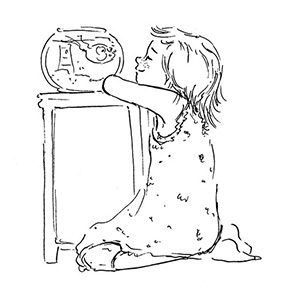
The phone rings.
Could it be Giselle?
Would she call this early?
Did I get the part?
Mom pokes her head
in my room.
“It’s for you, Suzy Q.”
My heart flaps.
I pick up the phone.
It’s Alison.
She has a question:
“Are we walking
to the library
as Sarah and Emily
or getting changed there?”
Alison and I carry
our outfits to the library.
We get dressed in
the ladies’ room
with the other Tween Time girls.
Besides Sarah
and Emily,
there’s a Florence Nightingale
and an Annie Oakley.
Ms. Mott greets us as
Harriet Tubman.
She carries an old railroad lantern.
The one boy is Chief Joseph.
Ms. Mott asks who wants to go first.
I raise my hand.
Ever since the audition
I’ve been feeling more
confident.
“I’m the poet Emily Dickinson,”
I tell the group.
“I was born on December tenth,
1830.
When I was a young girl,
I did regular stuff.
I went to school and to parties.
I liked to sing and draw
and play the piano.
I wore pretty dresses. All colors.
When I got older,
I stayed in my room more,
writing poems.
If I did go out,
it was only to my garden
or to visit my friend Susan
across the yard.
I helped in the kitchen.
I enjoyed baking.
Sometimes I lowered
gingerbread and other treats
from my window—in a basket—
to the neighborhood kids.
I had a dog, Carlo.
In my later years
I wore only white.
I died on May fifteenth, 1886.
Most of my poems
weren’t published until after
my death.
I’ll read one now.”
“Hope is the thing with feathers
That perches in the soul.
And sings the tune without the words.
And never stops at all.
“That’s the first stanza
of the poem called Hope.
I chose this one
because I’ve been
feeling grumpy lately.
But now I’m not.
Now I’ve got hope
perching in my soul.”
Ms. Mott leads
the applause.
Annie Oakley tells
how she was the star
of Buffalo Bill’s
Wild West show.
She pulls out two
cap pistols.
She twirls them
round her fingers.
She points them
at the ceiling.
POP! POP! POP!
I expect
one of the grown-ups
in the library to hiss
SHHHHHHH!
But no one does.
The girl who is dressed as Florence
says she didn’t have much time
to prepare because
they had a house full of
out-of-town company
over the weekend.
She tells us that
Florence Nightingale’s parents
hated the idea
of her becoming a nurse.
And then the girl
opens up
a toy nurse kit
and gives each one of us
a Band-Aid.
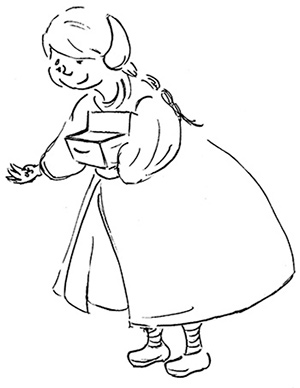
Sarah, aka Alison,
glides to the front of the room
like she’s getting an Oscar.
She tells how Sarah Bernhardt bought
her own coffin
and sometimes slept in it
instead of her bed.
She says it helped her
to understand
her tragic roles better.
“Creepy,” says Annie Oakley.
Ms. Mott—as Harriet Tubman—
goes next.
She tells how she escaped
from slavery
and helped others escape
using the Underground Railroad.
She sings a song she loved:
“Swing Low, Sweet Chariot.”
People from other parts
of the library
come and stand in the doorway
listening.
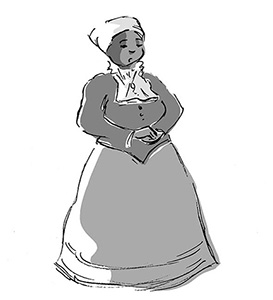
We all get a little teary-eyed
when Chief Joseph says:
“Hear me, my chiefs; I am tired.
My heart is sick and sad.
From where the sun now stands,
I will fight no more forever.”
Ms. Mott passes around
a box of Kleenex.
Alison and I are too anxious
about Giselle’s phone call
to take time to change our clothes.
We wear our 1800s outfits
down the streets of Ridgley.
Some teenagers call out a car window:
“A little early for Halloween!”
After I leave Alison,
I start to run home.
It’s not easy running
in a long dress.
I nearly catch my foot
in the ruffled hem.
Whew! I would not
want to ruin
Mrs. Harden’s mother’s
graduation dress.
So I speed-walk instead.
When I go into the house,
I hear Mom on the phone
saying: “I’ll tell her.”
“Wait!” I yelp. “I’m here.”
But Mom has already
hung up.
The phone call
was for me—
but it wasn’t Giselle.
It was Alison
asking if I’d gotten
the call yet.
I pull up a chair.
I sit by the phone.
Dad walks past,
pats me on the head,
says: “A watched phone
never rings.”
I stop watching the phone.
It rings before dinner.
It’s Giselle.
She is saying nice things
about the audition.
“You did really well, Suzy.
I especially enjoyed your cackle.
I hope you’ll try out for us again.”
“Again?” I say.
“For another play,” says Giselle.
“Gee, everyone was so good. But
we only needed four kids.
Hard choice. Really hard choice.
I’m sorry.”
My heart crumples.
I go up to the bathroom.
I turn on the tub water full blast
so no one will hear
my stupid sobs.